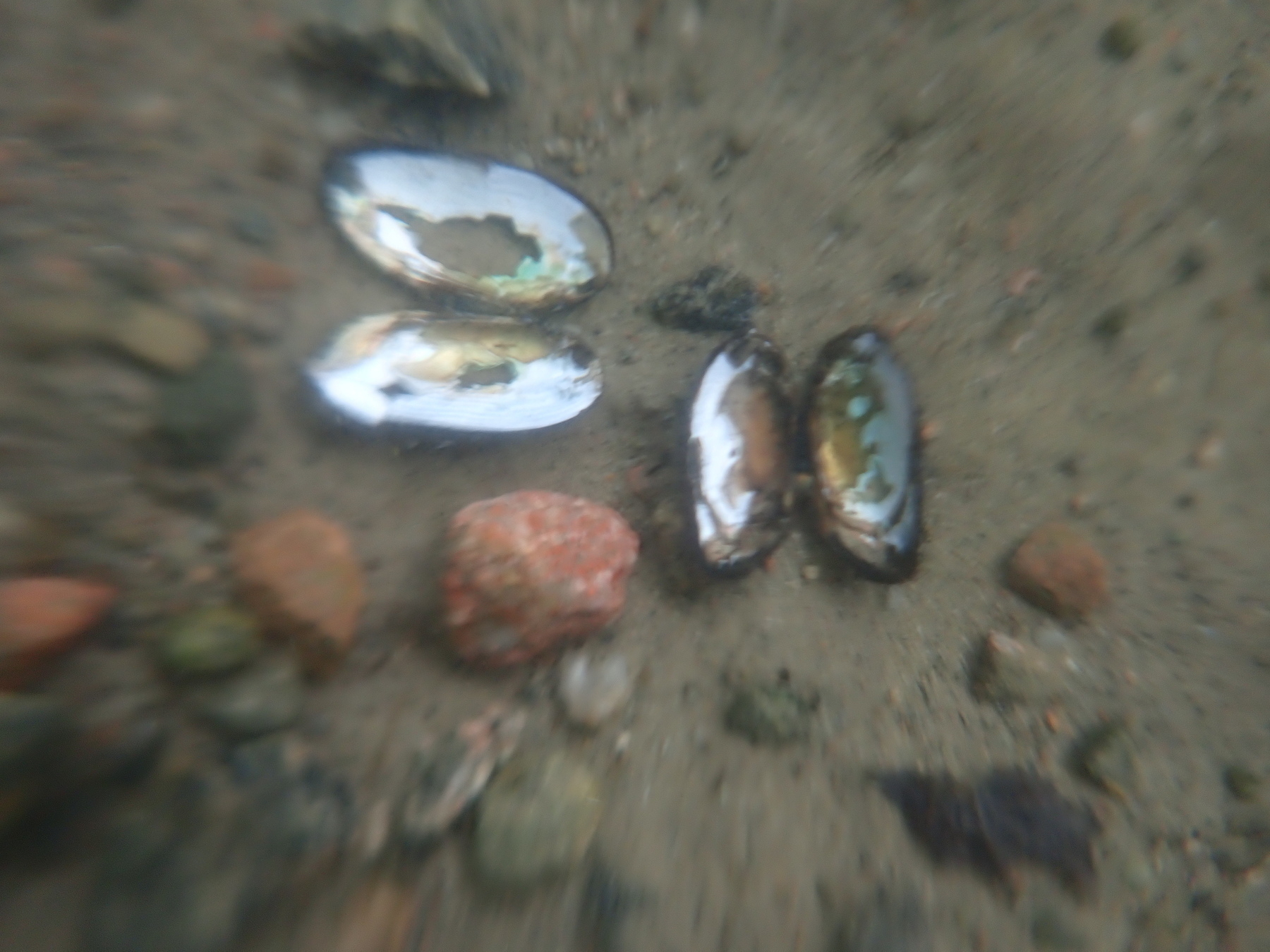Yessica's Pencils
Seven or eight years ago I made a cultural blunder while working in rural Guatemala.
When I bring my students to Petén, I tend to rent a room in a local home. The woman who steers the ship of that home, Merlina, is a small woman with tremendous strength of heart. She has nine children, and most of them have children of their own. Some have grandchildren. Merlina knows them all, prays for them all, and provides food and shelter for any who happen to be living under who roof or visiting for a while.
When I stay with Merlina and her family, I spend time playing with the kids, and I usually bring some small gifts to share. One of Merlina’s granddaughters, Yessica, has often drawn pictures for me, and I save every one of them in the pocket at the back of my journal. Every now and then I take them out and look at them, and admire the way she has grown as an artist.
When Yessica was an adolescent, she was plainly showing some autodidact artistic talent. She was also approaching the end of her time in free public schooling. I wanted to foster her talent however I could, so I gave her a new set of Staedtler pencils I’d brought for my own work. Six pencils of varying hardness, in a shiny metal tin. She was delighted. I left Merlina’s house that day feeling pretty good about the gift, even though it meant I’d have a smaller art kit to work with for the rest of the month that I’d be teaching abroad.

That evening when I got home Yessica was sad. Merlina had taken the pencils and shared them equally among all the grandchildren. I looked around and one was using a pencil to poke the dog. Another was using a pencil to dig holes in the dirt floor. I was very surprised and not very happy.
I told Merlina that those were special pencils for artists like Yessica, not ordinary pencils. Merlina patiently explained to me that in her culture it was up to her to provide for her family, and to ensure that everyone shared the good things that came into the household.
She was right, of course. I really wanted to help Yessica, but I was so focused on what I wanted for an individual that I was not thinking about different cultural norms, nor on the flourishing of the whole family. The next day I walked into town, bought a lot of common pencils and pens, and gave them to Merlina to give to her grandchildren as she saw fit. And I asked if she, as the head of the family, might consider setting aside the six Staedtler pencils for Yessica. She appreciated the gesture, I guess, and agreed to set them aside.
Funny thing: Yessica’s mom also heard the conversation, and, when she discovered that these pencils were special pencils, she decided Yessica was too young for them, so she set them aside for several years.
Seven years passed between my last visit to Petén and my visit two weeks ago. I’ve been homesick for that place, but COVID and a variety of other unexpected circumstances have kept me from returning until this winter.
For a variety of reasons I no longer teach that particular tropical ecology course, but I’ve stayed in close touch with some of my conservation partners in Petén. This winter my wife and I saw a window of opportunity and decided to fly down. In all my years of working in Guatemala, Christina had never been able to join me. This year, the stars aligned.
Naturally, we stayed at Merlina’s house again. Yessica is an adult now, and I’m happy to say she’s still making art. I opened my journal and showed her some of her youthful pictures. She laughed and covered her face. “I’ve gotten much better,” she said. “Let me show you.”
She retreated into one of the back rooms and emerged a minute later with hands full of watercolor paintings on canvas, a sketchbook, and loose pencil drawings. As I paged through the sketchbook my eyes filled with both wonder and tears. She’s so good! Without formal schooling in art, she has found online resources that have helped her to learn about value, form, texture, and color. Some of her sketches were almost like photos; others were deep abstractions that invited long examination. It filled my heart to see what she has been doing, and how she has been growing.
And then she showed me one more thing: the Staedtler pencil tin. Two of the pencils are gone, presumably worn down to nothing. A third is a mere stub. The others show signs of long wear. The tin has a patina that comes with frequent handling in a rainforest climate. Her mom held back the pencils until she thought Yessica was ready for them, and then handed them over so that Yessica could continue to grow as an artist.

I have to admit I cried a lot when I saw the art and the pencils. And then I reached into my art kit and, with Merlina’s permission, gave Yessica a new set of pencils and pens to work with, and a new pencil case to hold it all.
After I got home last week, Yessica sent me some photos of the work she has been doing recently, as an employee of the Ministry of Culture and Sports: she has been making indigenous-themed murals in her community. Which is to say: she’s working as an artist. It’s not her only work, but it’s part of what she does, and she does it well. My heart is full, Yessica. I’m so glad to see what you are doing, and I hope your art continues to grow and to fill other hearts in the community around you.
Sketching with Daniela in Tikal
We sat on top of the ruins of a Mayan temple, watching the sun sink towards the western horizon. Tikal National Park limits the number of people who can take a sunset tour each day, and I wanted to offer my wife something special. So we hired a guide, hiked in, and climbed the steep wooden stairs to sit on the platform. As the sky slipped into its evening colors, a keel-billed toucan sailed past, just above the treetops.
The platform on top of Mundo Perdido can hold about thirty people comfortably, but I thnk we were closer to thirty-five. We sat shoulder-to-shoulder with one another, perched above the dense canopy. In front of us we could see the combs of Temple IV and Temple I rising above the trees. In this part of Guatemala the land is low and level, with slight ridges undulating across the forest.

The colors of the trees are a lesson in ecosystems. They’re not just green. Most of them are topped with various kinds of bromeliads, plants that don’t send roots down into the soil but that live in the air. The main function of their roots is to cling to the branches. The bromeliads collect rain in their leaves, and get their energy from the sun and the air. Bright green succulents, yellow and orange orchids, and red fronds all arise between the leaves and flowers of the trees and vines. The nearest trees have vibrant colors; each wave of trees into the distance is darker green, fading to blue and purple into the far horizon.
Unzipping the backpack at my feet, I pulled out my sketchbook and colored pencils. Looking to the North, I began to sketch the slowly changing colors.
To my left sat a family from Spain. A girl who was maybe three or four years old sat between her youthful parents. She glanced at my sketchbook and then asked her father, “¿Papá, tienes un bolígrafo?” “Daddy, do you have a pen I can use?” No, he replied.
I dug into my backpack and pulled out some more paper, and laid a sheet down on the wood in front of them, and put down a tri-colored ballpoint pen where the girl could reach it. “¿Quieres dibujar el bosque conmigo?” “Do you want to sketch the forest with me?” She looked at her parents, who nodded their approval, and she began to draw. Her parents looked at me with smiles, and watched their daughter draw. Soon she was frustrated that her sketch didn’t look the way she wanted it to, so I opened my pencil case in front of her and chatted with her about what colors we saw in the trees and in the sky. Each time we named a color, she took the appropriate pencil and drew some more. We continued that way for the next twenty minutes or so until the sun began to touch the horizon and it became both too dark and too brilliant to keep sketching. Together we all watched the sun blaze and shoot out rays above a small cloud before disappearing below the distant hills.

Before we parted that evening, I asked if I could take a photo of her art, telling her it was one of the nicest drawings I’d seen in a long time. She smiled and said I could.
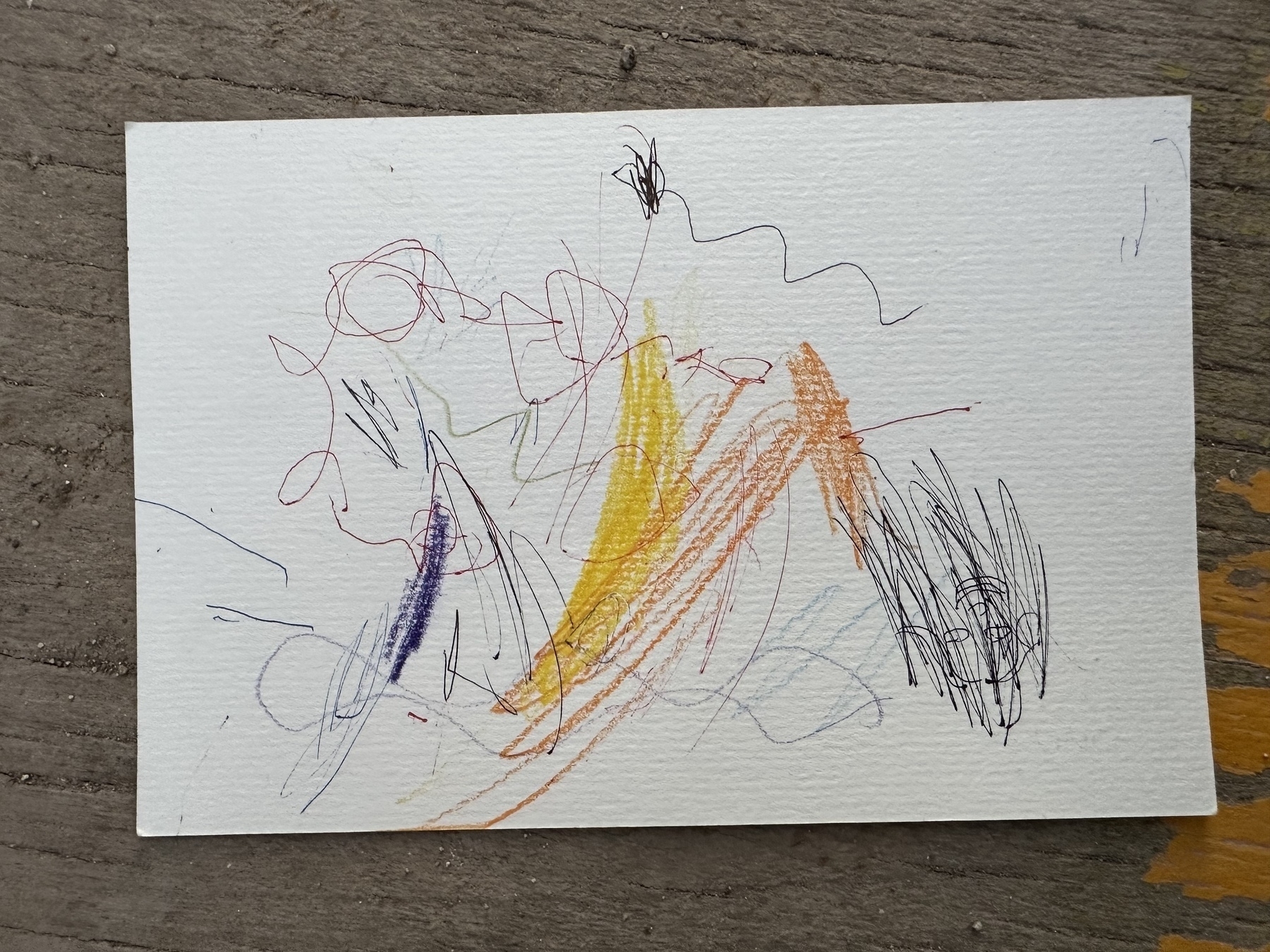
The next day, while walking through the park again, we ran into the family and I asked her name. “Daniela,” she said. Daniela, I hope you had a wonderful time in Tikal, and I hope you keep making art. Thanks for sharing the moment with me!
Dogs.
These are my son’s and daughter-in-law’s dogs. They watched us as we said goodnight in the driveway after a visit this evening. I liked the light, and their faces.

Bumblebees in Patagonia
Spent part of February in Aysén, Chile. Kept seeing things that made me want to slow down, like these two bumblebees. The orange one was drenched with rain and clinging to a thistle, so I’m not at all confident in its ID, but I think it is a bombus dahlbomii, which is endangered and indigenous. It is also called the Patagonian Bumblebee. Only saw this one. The other was abundant and easy to find. I believe it is bombus ruderatus, which is imported and invasive, brought to South America from Europe in order to pollinate red clover. I feel fortunate to have see the endangered bee. I looked for more of them but never saw another.

Pelican marine phone case
I don’t do much product review anymore (I had an outdoor product review blog 25 years ago when I was an outdoors and fly fishing guide) but every now and then I find something that really impresses me. This Pelican marine phone case with lanyard (pictured) and I just came back from a week of rafting in Aysén, Chile. I used it every day on white water and felt very confident in the lanyard and case. The touchscreen works well enough and the photos were crisp and clear. I used this with my iPhone 14 Pro, which is also in an Otterbox case. Didn’t have to remove the Otterbox case to fit into the Pelican pouch, though it was snug. The pouch is nicely padded with sealed air pockets that protect the phone and that would probably help it float, though I did not test that out!


I’m between airplanes so this will be brief: check out @jthingelstad and his Weekly Thing.
So grateful for people like Jamie who help me keep learning a little more every day.
Left to my own devices on airplanes I often turn off the screen and think about mathematics, ecology, or both. Often I think with pen and paper, giving me a record of questions to look into when I get home.
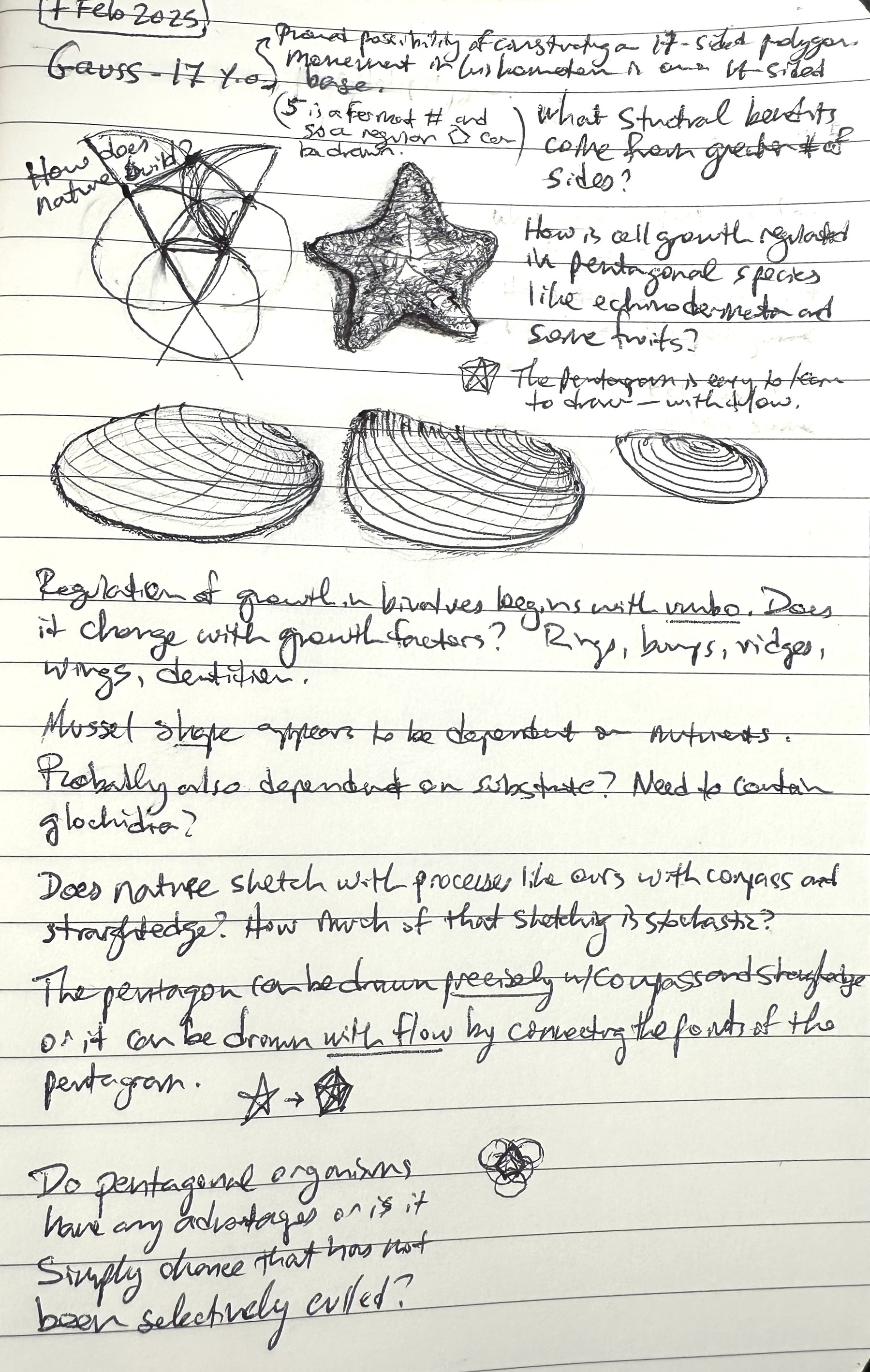
Related to my previous post, here’s something I wrote about the time I invited a beggar to lunch. The conversation did not go as I thought it would. It went even better.
Originally published in Sojourners online:
Who is my neighbor?
The Good Samaritan story and loving our neighbors.
A short piece of my conversation with John Meyer on his Leadmore podcast:
Environmental Writing Now
This afternoon several of my alums and I talked about what it means to be an environmental writer and storyteller right now. We look back on those who inspired us and, much as we love their work, we recognize that our own writing needs to respond to a different moment.
I’ve been revisiting a number of the writers who inspired me this year: Rachel Carson, Ursula LeGuin, Kathleen Dean Moore, Henry Bugbee, Robin Wall Kimmerer, Parker Palmer, Wendell Berry, John Elder, Gary Snyder, Wes Jackson, Bill Vitek, Robin Lee Carlson, Cindy Crosby, Suzanne Simard, Norman Wirzba, Mary Evelyn Tucker, Thomas Berry, Dan O’Brien, Aldo Leopold, Terry Tempest Williams, Strachan Donnelly…the list is longer than that, but those ones are a good sampling.
Each one has their place in my personal canon. Each one has helped me see something where and when they live. Each one brings their experience and shows me how they use it. Kathleen Dean Moore’s job might be most like my own; Aldo Leopold’s and Cindy Crosby’s landscapes are most like mine. Robin Lee Carlson has helped me become a better teacher. LeGuin has helped me to imagine worlds differently. And so on.
My alums both feel deeply the urge to make a difference with their lives. Both have earned graduate degrees, and do good work in their fields. But they—and I—share the sense that we need good stories.
The question is: what do those stories look like right now?
A.I. is a new challenge. How long until we are hit with a deluge of words not handcrafted crafted in the forge of human imagination but mass-produced by machines?
Another challenge: some say idylls and paeans to nature are a luxury we can no longer afford. Others point out that we are already weary of lamentations and nature obituaries.
Many of us want to write words of hope, be we also know they have to be tempered with sobriety.
For today, at least, we have settled on this: right now, as we welcome our children and grandchildren into the world, we want to bear witness, to testify to what we see, while we see it.
If you aren’t subscribed to @jthingelstad ’s newsletter you should check it out.
Weekly Thing 307 / Attention, Goose, Pulse weekly.thingelstad.com
It’s one of my go-to reads each week. Makes me wonder how he finds so many interesting things to share! Here’s one of my faves this week: you might share a pin with a lot of other people.
Pearls
Reading this morning about freshwater mussels (surprise!) in four contexts:
- This short documentary about what Urban Rivers is doing with floating gardens in Chicago. They’ve made some habitat for one of the hardier species of unionid mussels native to the river. Did you know that some mature mussels can filter 20 gallons of water a day? Here in Sioux Falls I want to restore our river. Organizations like Urban Rivers can be a good inspiration for what we might do here. If this appeals to you, I suggest making a donation to Friends of the Big Sioux River. They do a lot of good work on a tiny budget.
- David Strayer’s Freshwater Mussel Ecology: A Multifactor Approach to Distribution and Abundance Strayer recognizes that ecologists often explain distribution in terms of general factors but without much quantification and precision. His book attempts to describe “a literal, quantitative prediction of the distribution and abundance of individual species.” (p. 6) Mussels are easy to overlook and often hard to find. They can be found in water that is still or fast-moving, clear or murky, shallow or deep. They might be embedded in sunken logs, deep in the benthos (the substrate at the bottom of a body of water), or wedged into the cracks of bedrock. And they might be in places where the current, or predators like alligators and snapping turtles make it perilous for biologists to seek them by diving an sticking their hands into dark places underwater! So I’m enjoying reading about other ways of modeling where they might be found.
- Suetonius' Lives of the Caesars, especially the section on Julius Caesar. Julius Caesar is remembered for many things, but if you click that link and then search for “pearl” you’ll see some of the ways mussels appealed to him. You might be thinking “Don’t pearls come from oysters?” Yes, they do. But they can also come from many other mollusks that have nacreous shells, including snails. Some freshwater mussels are called margaritiferidae, from Latin words that mean “pearl-bearing.” They are among the most threatened of the unionid freshwater mussels. The nacre inside unionid mussel shells is what many contemporary shirt buttons imitate, harking back to a century ago when we harvested mussels by the tons out of our rivers to turn them into pearly shirt buttons. Our quest for fashion did tremendous harm to the health of our rivers and left us with much dirtier water. Suetonius points out that Julius Caesar also had a taste for fancy pearls, and could guess the value of a pearl by holding it in his hand. He outlawed wearing pearls for most of Roman society, and gave a particularly large pearl to one of his mistresses. That pearl was worth six million sesterces, which is almost unimaginably expensive. Something about pearls really catches our eye, and Suetonius tells us that Julius Caesar’s invasion of Great Britain was motivated by his desire for pearls.
- Jesus told a story once about someone who was willing to sell everything he had to buy a single pearl. Those few sentences have had a broad effect on religions around the world. They also tell us something about the economy of fashion two millennia ago. Julius Caesar died a few decades before Jesus was born in a small part of the Roman Empire, so Jesus might well have been familiar with the elite Roman taste for pearls. Perhaps he had Julius Caesar in mind when he spoke of that man who sold everything. If so, that would turn Jesus' parable into a political commentary.
If you know me, you know this is where I live: the intersection of classics, great texts, religion, invertebrate and riparian ecology, mathematics, and clean water. I need a simpler way to describe the intersection of my interests, but for this morning I’ll leave it at this:
This morning I’m reading about pearls.
A little more from Leonardo's _A Treatise On Painting_
His first paragraph is itself a work of art, and could be taken as a summary of what a good education looks like:
- knowledge of perspective and dimension;
- teaching from someone who understands the parts of things;
- study of nature;
- time spent with old masters;
- practice.
Prayer to the God of the Sick and Suffering
God who suffered with us,
Please remember what it was like
to be human,
Incarnate as a baby
Who could only cry for help
With the most basic needs;
Enfleshed as a youth
With tight skin and growing bones,
And awkward, rapid growth;
Enmeshed in an adult economy
With tight finances and growing commitments,
And new obligations to young and old alike;
Embodied in a fragile frame
That bends with age, and declines,
And falters, and slowly gives way to time.
Eternal God, we ask you to remember
What it was like to be us, without eternal sight,
And full of love for this small space and time
And all who dwell within it.
Be with us, and help us to love those who suffer as you did.
And remember us, we pray.
—-
I wrote this while thinking and praying this morning for a number of friends who are suffering from what seems like untimely cancer. I had cancer when I was in graduate school, not long after the birth of our third child. The doctor scheduled me for surgery two days after the diagnosis. When I asked if I could get a second opinion, he told me I might only have a few weeks to live, so I’d better get that opinion quickly. I opted for the surgery instead. That was 25 years ago now, during Holy Week in the year 2000. I had surgery on Good Friday. It’s not Lent yet, but for my friends who are either receiving chemotherapy or preparing for it this week, this year likely feels like a long Lenten fast, one which will leave them with hard memories and some bitter scars.
It is far from a perfect prayer, if by perfect we mean ready for inclusion in a breviary. I very much appreciate breviaries, because they tend to include prayers that others have found helpful to pray, and one has the sense of praying in community that stretches across time when reciting those prayers. They also tend to be poetic and memorable. I’ve tried in this quick writing to be poetic, mostly because the poet’s tools help to frame ideas succinctly.
As I prayed this morning, I wondered: does God dwell in eternity in such a way that makes “these momentary afflictions” seem unimportant? Intellectually, I can stretch my imagination to think that might be so.
But this prayer was one I wrote to invoke a God who has been God with us, and who has experienced pains both small and great. As Victor Frankl pointed out in his book Man’s Search For Meaning all pain is great pain, because pain, like a gas, expands to fill available space. The pain of an infant, the pain of a growing adolescent, the pain of a young adult, and the pain of an aged relative or neighbor (all people are our relatives and neighbors) are all real pain.
And in praying this prayer I am not so much trying to change God as to remind myself of a God who understands suffering. As I have written elsewhere, prayer is, for me, a stretch before a long run, and a preparation to act as I think a loving God would act.
I welcome your responses, but I’ll say in advance that if this prayer strikes you as failing to match your version of orthodoxy — whether that be a theistic orthodoxy or an atheistic one — I invite you to pray as you will. This is my prayer, and it might be helpful to someone else even if you don’t care for it.
29 January 2025
Reading Leonardo On Painting. So good.
For the last year I’ve been intentional about sketching and painting as a means of studying nature.
There are other upsides, too: I feel better, and I enjoy doing something creative that no machine can do for me.
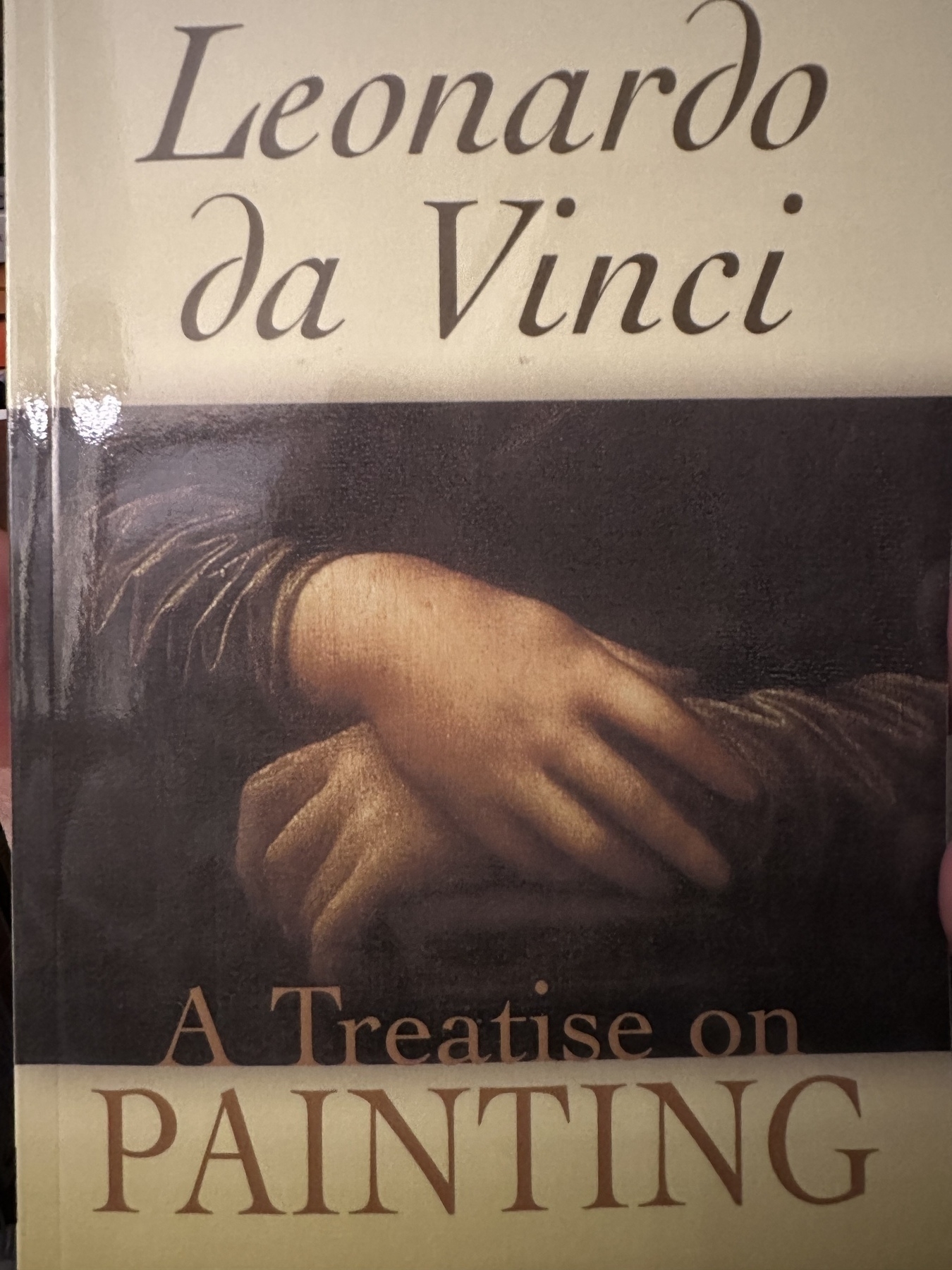
In case you’re wondering: I’m a philosophy professor who studies religions and liturgies, great texts, freshwater invertebrates, rainforest ecology, salmonids, mathematics and A.I., classical and ancestral languages, and world philosophies. Inter alia.
Wisdom and folly in all quarters
Thinking about this good word by Leibniz:
“The majority of the philosophical sects are right in the greater part of what they affirm, but not so much in what they deny.”
I think it’s true not just for philosophical sects.
Source: G.W.F. Leibniz, “Letter to Remond,” 10 January 1714 in Gerhardt, C.I., ed., Die Philosophischen Schriften von Leibniz (Berlin: Weidman, 1875-1890, reprinted Hildesheim: Olms, 1965) Vol. III, p. 607
Another book just arrived in the mail today. Send help. (Help = bookshelves.)
Strayer’s Freshwater Mussel Ecology: A Multifactor Approach to Distribution and Abundance.
(More info in Alt text!)
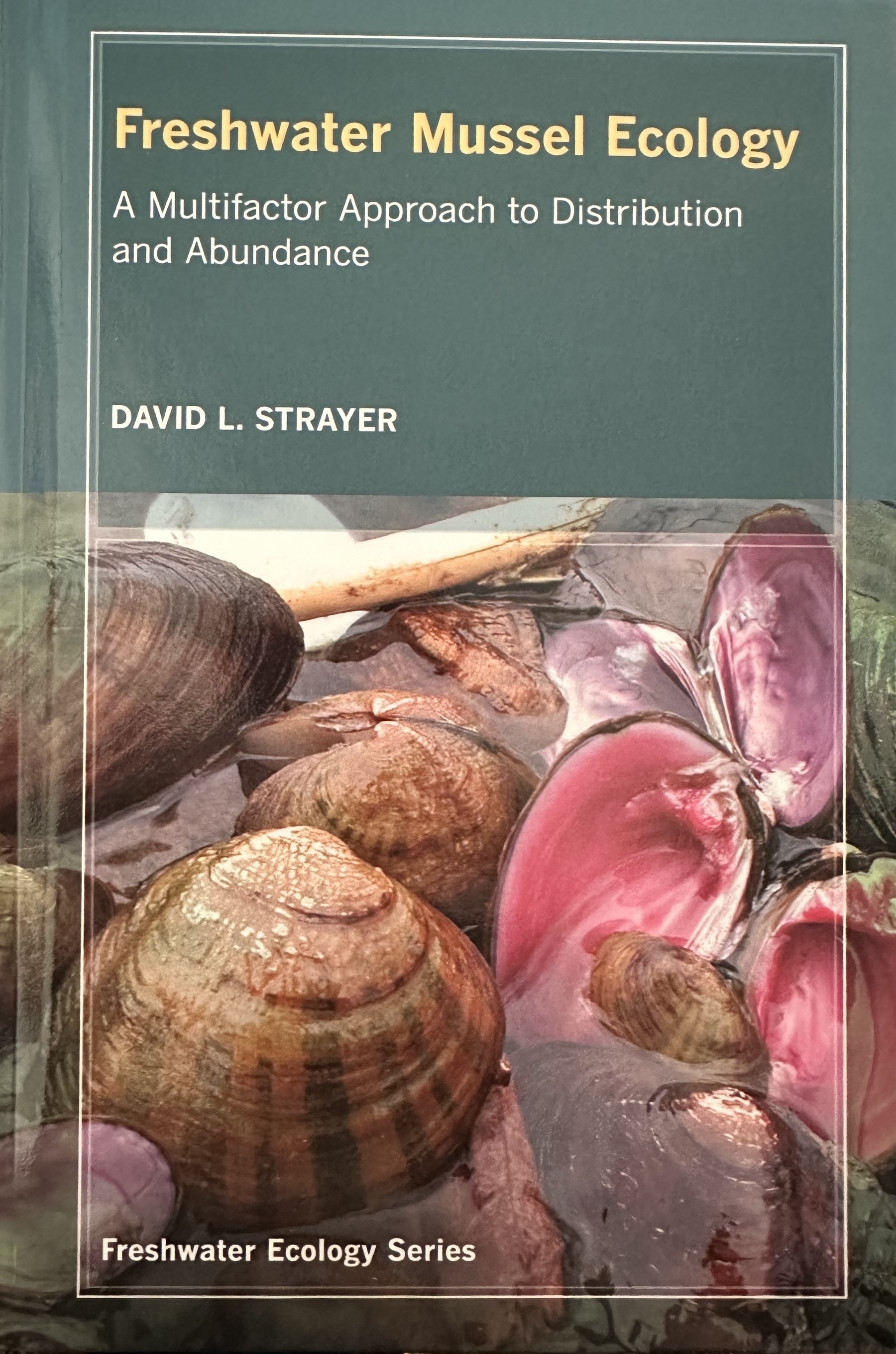
Who is doing a good job of low-tech freshwater mussel restoration? I like the floating gardens that Urban Rivers is doing in Chicago, and they have some promise. Are there other examples?
“Can you eat them?”
All of us who study freshwater mussels are eventually asked the same question:
“Can you eat them?”
The frequency with which we are asked that question is helpful for understanding some of our environmental problems: We value what we know how to use.
Which means endangered mussels don’t just need regulatory protection; they need us to value them even when we can’t think of what use they are.
(Image: two dead freshwater mussel shells on the bottom of a sandy lake. I took the photo in Ontario in the summer of 2024.)
